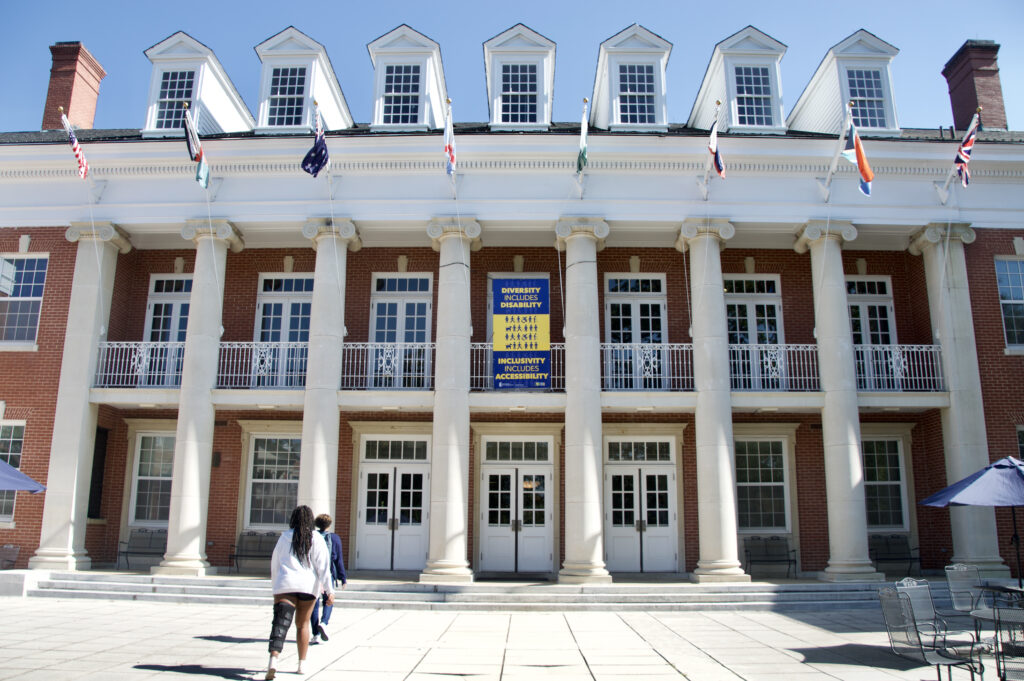UMW Honors Program welcomes alumnus Ava Spencer as first post-baccalaureate fellow
4 min read
The Honors Program welcomes about 12% of the UMW student body in the fall of 2023. | Abbey Magnet, The Weekly Ringer
by NORAH WALSH
Editor-in-Chief
Even though university admission is declining, the UMW Honors Program thrives, welcoming about 12% of the UMW student body into the Program. As the standard for honors programs is usually 5–10% of the student body, the responsibilities and roles have outgrown the capacity of Dr. Mara Scanlon and Dr. Kelli Slunt who work part-time as directors of the Honors Program in addition to teaching English and chemistry, respectively.
So, when UMW expected to welcome its largest incoming freshman class in Honors Program history in the fall of 2023, this number raised an alarm in the Honors Program, as there weren’t enough hands on deck to be able to fulfill the numerous responsibilities and roles that the Program requires.
In light of this, Scanlon and Slunt spoke with the director of Virginia State University’s Honor Program at one of the meetings of the Virginia Honors Collegiate Honor Council. There, they were recommended to take the same step as some other honors programs, which was to establish a post-baccalaureate fellowship.
Considering the array of positive effects that this role could have on the Honors Program, Slunt and Scanlon began to craft the responsibilities of the Honors Post-Baccalaureate Fellow, and they sent out the job posting via email at the end of the spring 2023 semester to recent alumni.
Flash forward a couple of months, and Ava Spencer, a 2023 graduate in environmental science on the social track, was hired to be the first post-baccalaureate fellow for UMW’s Honors Program. In this position, her role pertains to assisting in the City as Text program, which welcomes incoming Honors students to campus early and leads them through an array of projects and activities; facilitating discussion in the Honors Service Learning course, which is a required course in the Honors Program; attending open house events as a representative and alumna of the Honors Program; and establishing an alumni affinity group to better connect with Honors alumni and keep them involved in the UMW community. In addition, Spencer also acts as a liaison to the Honors Student Advisory Council (HSAC) and plans community activities, which often involves cooperating with other student groups on campus.
However, this position is twofold in its educational opportunities, as it offers an extra level of support to the Honors Program in their endeavors as well as helping the fellow gain workplace experience.
According to Slunt, this fellowship offers a useful step into the post-baccalaureate world, allowing the fellow to become comfortable in the professional skills that they learned through UMW’s liberal arts education.
Slunt commented on the position’s twofold nature when she considered, “what needs need to be met for the Honors Program, but also how can we help support our students to gain some skills?”
From the perspective of Spencer, who is the inaugural Honors Program fellow, the position has utilized a lot of the skills she developed while completing her undergraduate degree working in the Office of Admissions, running various Instagram accounts for clubs on campus, being a peer mentor and interning with the Office of Sustainability.
One of the strongest aspects of this fellowship is its development of alumni relations, according to Slunt.
For this work, Spencer collaborates with Phillip Duggins, the associate director of regional alumni engagement, and Mark Thaden, the executive director of alumni relations and advancement communications. Together, they implemented an Honors affinity group, which helps bring alumni back to campus to facilitate conversations and connections between current and graduated Honors scholars.
As an alumnus, Spencer reflected on her work with the Office of Alumni Relations. She said she was excited about these connections, as “even after this position, there’ll be opportunities for me to be involved. Because I love UMW, and I love the Honors Program.”
Spencer also noted the success of the fellowship and delved into the aspect of alumni relations for Honors alumni.
“The goal for [the Honors affinity group], I think, is that they’ll be so self-sufficient—hopefully pretty soon—so that when I leave, it doesn’t just sort of stop,” said Spencer. “And that I think the goal is to sort of make the alumni know that we still want them to be a part of the community, that they’re still a valued part of the Honors Program and to help them getting engaged on campus or online as best as possible.”
From the perspective of the Honors Program, the fellowship has been successful in helping them fulfill the responsibilities that help enrich the Program, most notably the alumni affinity group.
The position is set up to extend over a 10-month period, beginning at the end of the summer with the Honors City as Text Program and ending with graduation in May. While it is technically a renewable position, the intent behind this fellowship is to welcome a new recent alumnus each year, and the continuation of the fellowship depends on the funding and administrative approval for the position.
This piece was written for the Fall 2023 edition of the Honors Outlook newsletter.


